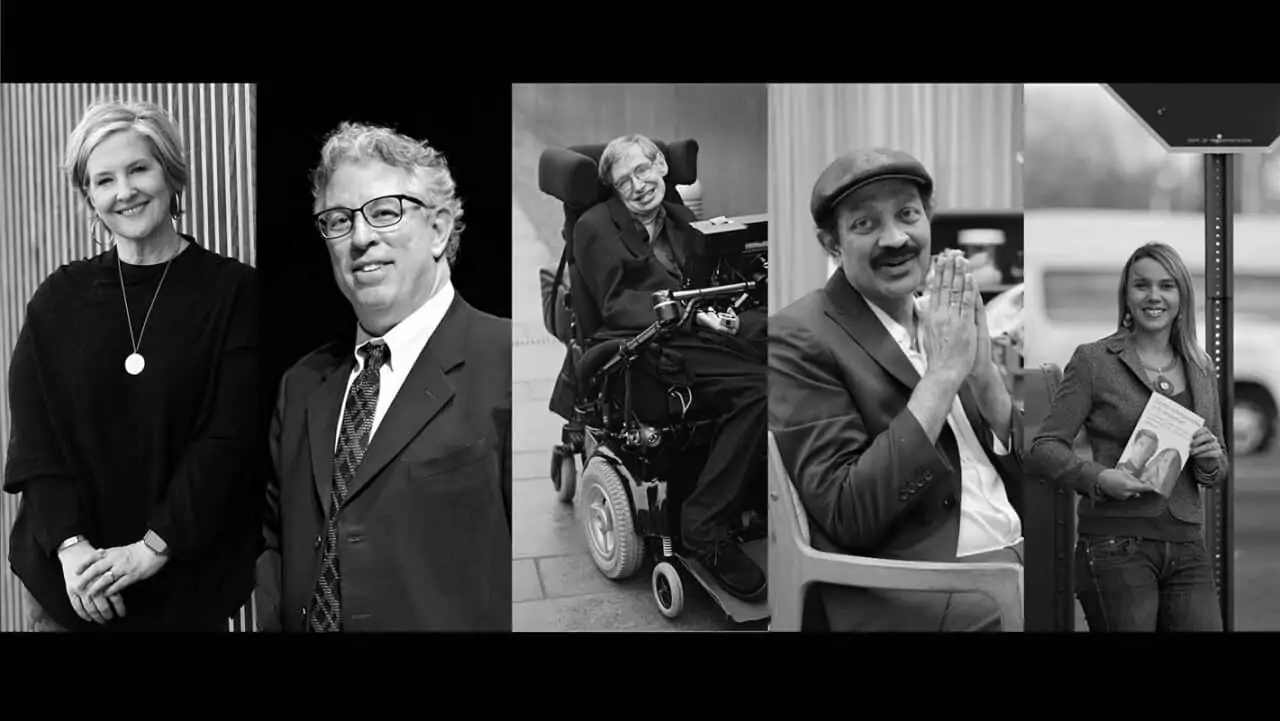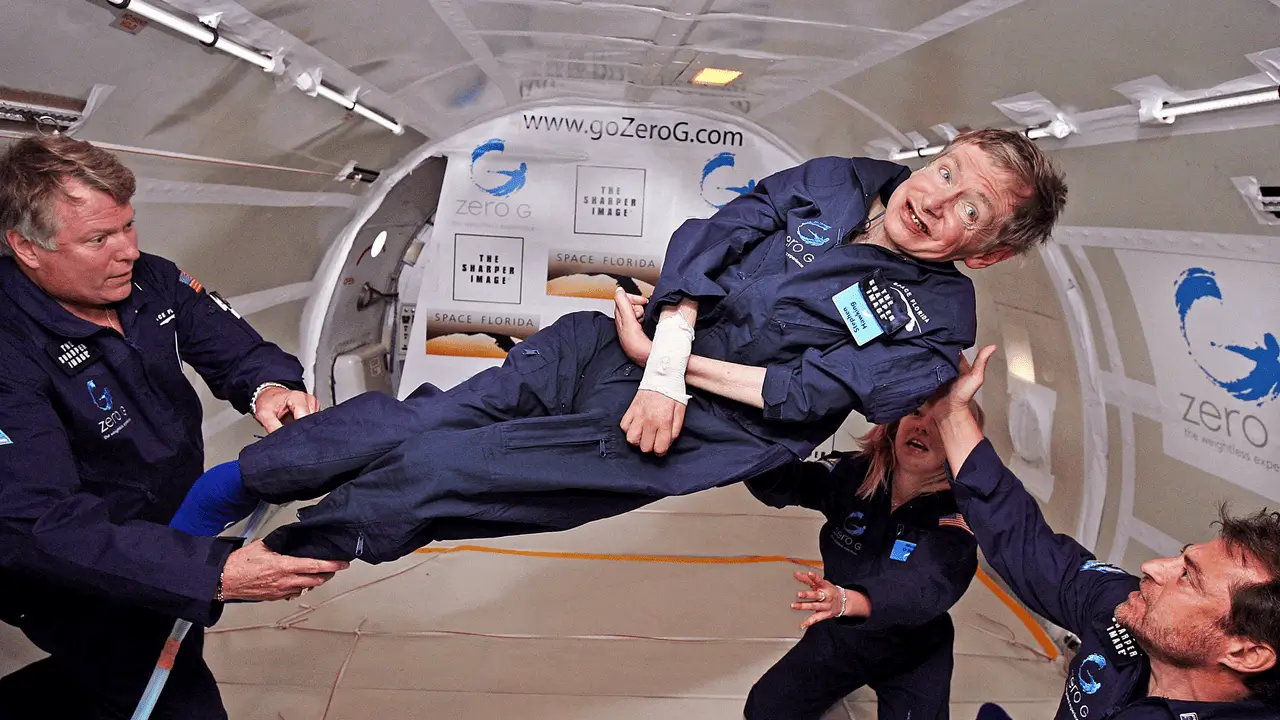📅 20 Aug 2024 • 📖 20 min read
Empathy lets us understand another’s struggles from their unique point. But why is empathy important in society and life? And what did Stephen Hawkings say on it?Do you sometimes wish you had someone to talk to who would listen without interrupting or offering solutions? Have you ever wanted to hug someone who was in distress, even if they didn’t tell you what was wrong?
Feeling heard and understood, and being able to do both, is a human need. Narcissists, because they lack empathy, do not have this quality.
The beauty of empathy lies here: While we yearn to receive it from others, we also feel the urge to give it out to others.
Empathy is our ability to understand and feel another person’s struggles from their unique standpoint (“feel where the shoe pinches on their feet”).
But why is it important to have more empathy in today’s world? Wouldn’t it drain us?
Find out what Stephen Hawking and other scientists said.

Why Is Empathy Important In Society: Stephen Hawking And Four Other Scientists
Empathy is important in society as a key component of social intelligence and social bond formation. It lets us understand and share the feelings and perspectives of another person. This allows us to connect with others at a meaningful level, respond to their needs in a compassionate way, and build a humane society.
Research shows we are more helpful to others (prosocial) when we have greater empathy.
We bring you five incredible insights by five outstanding scientists on empathy that can help us understand why empathy is so important for humans to progress and thrive.
1. The quality I would most like to magnify is empathy: Stephen Hawking
Stephen Hawking (8 Jan 1942 – 14 Mar 2018), one of the most loved cosmologists on Planet Earth, best known for his book A Brief History of Time, was noted for his sense of humor.
One amusing remark he made about being one of the world’s most popular scientists,
The downside of my celebrity is that I cannot go anywhere in the world without being recognized. It is not enough for me to wear dark sunglasses and a wig. The wheelchair gives me away.
Hawking strongly believed in love and family. He famously said, “It would not be much of a universe if it wasn’t home to the people you love.”

This is the inspiring story he left us with:
Adaeze Uyanwah, a 24-year-old student, had won a prize to go on a tour of the Science Museum, London, accompanied by Prof. Stephen Hawking. Uyanwah asked the late celebrated physicist which human trait the professor would most like to change.
Hawking answered:
The human failing I would most like to correct is aggression. It may have had a survival advantage in caveman days, to get more food, territory, or a partner with whom to reproduce, but now it threatens to destroy us all.
Mark it, Hawking called aggression a human failing.
Hawking said that he felt aggression had outlived its survival value in the modern world, and to get aggressive towards another is to fail miserably in our humanness.
Hawking specifically mentioned that it is this failure that could trigger a nuclear war and destroy the whole of humanity.
Uyanwah remembered asking the professor which human traits he would like to see more often.
Hawking was clear that he would like to see more kindness and understanding in this world. He advised us to grow our empathy.
His words:
The quality I would most like to magnify is empathy. It brings us together in a peaceful, loving state.
— Stephen Hawking
Stephen Hawking dedicated much of his life to explaining the existence of black holes. He died in 2018 without being honored with a Nobel Prize.
However, his friend and research colleague Roger Penrose received the 2020 Nobel Physics Prize for proving the formation of black holes in case of a gravitational collapse of a star.
2. Mirror Neurons Allow Us To Empathize With Other’s Pain: V S Ramachandran
Mirror neurons can make us feel more empathy.
That’s what the mirror neurons are doing, allowing me to empathize with your pain.
— V S Ramachandran
One of the world’s most influential neuroscientists, and the director of the Center for Brain and Cognition at the University of California, San Diego, V S Ramachandran, talked of the relationship between empathy and our brain cells — the mirror neurons.
The concept of mirror neurons first came to light in the 1990s.
A group of Italian scientists, led by neuroscientist Giacomo Rizzolatti, discovered that certain brain cells that got active when a monkey performed an activity, also became active when that monkey observed another monkey performing the same action.
They suggested that the monkeys’ brains had mirror neurons that fire when they observe or hear any activity that is identical to their own action.

Later studies found humans have mirror neurons that are much more intuitive, flexible, and evolved than those in the monkeys.
Mirror neurons occur in several areas of the brain—the prefrontal cortex, the posterior parietal lobe, the superior temporal sulcus, and the insula.
A horde of studies on empathy for pain using fMRI revealed the anterior insula and the anterior cingulate cortex were routinely activated, both while experiencing pain and when seeing another person in pain.
Prof. Ramachandran has been a passionate flag-bearer for mirror neurons. His NYT bestseller book — The Tell-Tale Brain — walks us through his argument why mirror neurons might be crucial in helping humans go leaps beyond the apes in developing self-awareness, humor, and complex thinking.
He famously said, “… mirror neurons will do for psychology what DNA did for biology.”
Asked to introduce mirror neurons, he replied,
These are neurons which fire… when I simply watch another person—watch you reach out and do exactly the same action. So, these neurons are performing a virtual reality simulation of your mind, your brain.
Therefore, they’re constructing a theory of your mind—of your intention—which is important for all kinds of social interaction.
Relating these to empathy, he said,
These (mirror) neurons are probably involved in empathy for pain. If I really and truly empathize with your pain, I need to experience it myself. That’s what the mirror neurons are doing, allowing me to empathize with your pain—saying, in effect, that person is experiencing the same agony and excruciating pain as you would if somebody were to poke you with a needle directly. That’s the basis of all empathy.
He also regretted that he might have been the one responsible for the popular misconception that mirror neurons are responsible for everything we humans are today.
And I myself am partly responsible because I made this playful remark, not entirely serious, that mirror neurons will do for psychology what DNA did for biology and open up a whole new field of investigation. Turned out I was right, but it’s overdone—I mean, a lot of people, anything they can’t understand, they say it’s due to mirror neurons.
3. Empathy communicates that incredibly healing message, ‘You’re not alone.’: Brené Brown
Brené Brown is a research professor at the University of Houston, where she holds the Huffington Foundation Endowed Chair. Her books include Rising Strong, Daring Greatly, and The Gifts of Imperfection.
She’s fond of saying,
Empathy has no script. There is no right way or wrong way to do it. It’s simply listening, holding space, withholding judgment, emotionally connecting, and communicating that incredibly healing message of ‘You’re not alone.’
According to Dr. Brown, there are four attributes of empathy:
i. Perspective-taking.
Perspective-taking means our willingness and ability to view and feel the world through the eyes of another person, like “walking in their shoes.” It demands that we place our own issues aside and truly listen to what others are dealing with.
ii. Staying non-judgmental.
Dr. Brown feels judging another person’s grief or hardship degrades the experience. We usually do it trying to shield ourselves from the pain they are going through. When we step away from the judge’s chair, we open up to their feelings and do not say things that dismiss their experience or make them feel bad about expressing it.
iii. Recognizing emotions.
Recognizing the emotion involves searching within the self and finding what it’s like to experience what the other person is experiencing. It means we are willing to completely accept, and possibly give a name to, what they are feeling. We can confirm if we have correctly identified their emotion, for example, by asking, “I’m sorry, it seems like you’re feeling sad about that.”
iv. Communicating correctly.
Dr. Brown warns we must control our urge to say we “understand their pain” and offer solutions (or worse, a guilt trip). We rather need to validate their experiences and emotions. To paraphrase Dr. Brown explicitly, “It sounds like you are in a hard place now. Tell me more about it.”
Brené Brown reminds us that empathy is a skill. We can train ourselves to have more empathy, and with frequent practice, get more proficient at empathizing with our fellow humans.
Empathy is important because, according to her, when we give others empathy, we encourage compassion, authenticity, and intimacy to flourish in our relationships.
4. Empathy is what makes us human: Bruce Perry
Are we losing our ability to empathize?
“Empathy is what makes us human,” says brain scientist Dr. Bruce Perry, a trauma expert and co-author (with Oprah Winfrey) of the book What Happened To You.
Human beings are biological creatures with genetic gifts… The only way we survived was by forming relationships, collaborative relationships… Human beings are neurobiologically meant to be connected to others: to live, work, hunt, play, invent, and die in groups.
Our brain is a social organ; we are social animals. We don’t have any natural body armor, camouflage, stinging other things. We form groups. Human beings are ‘meat on feet’ to the natural world.
The only way we survive is by forming collaborative groups, by sharing what we hunted and what we gathered with everybody else in our group.
Bruce Perry outlines the 4 qualities of empathy:
- to be able to see the world as others see it
- to be nonjudgmental
- to understand another’s feelings
- to communicate our understanding of that person’s feelings
The typical American spends 11 hours a day interacting with digital devices, and not with fleshy objects! And I want to talk about the consequences of this for how we end up expressing our ability to be compassionate (or not).
You see it all the time, complaints in the psychological literature about the disconnectedness of multitasking constantly with our phones… but we do it ourselves. It breaks the rhythm of social contact, of empathic engagement — and the truth is: those things are physiologically meaningful.
- Did you know, people with a positive mindset have these 6 traits: MOGRAH: 1. Mindfulness 2. Optimism 3. Gratitude 4. Resilience 5. Acceptance 6. Honesty?
5. Bullies and Victims, Both Score Low on Empathy: Izabela Zych
Are the victims of bullying low on empathy?
Read that again — we said bully victims, not bully perpetrators.
Izabela Zych Ph.D. is an Associate Professor in Psychology at the University of Córdoba (Spain). Her major research interest focuses on bullying and cyberbullying (trolling). She holds empathy plays a significant role in bullying.
School bullying is a form of aggression that can harm both in the short-term and long-term.
Bullying involves three parties — the perpetrator, the victim, and the bystander audience.
Zych reminds us that school bullying often has an element of the unwritten “law of silence.”
Students who see or know about the act do not report it to the authorities or their parents out of fear that they could be the next victim.
In both cases, face-to-face bullying, and the “faceless” trolling, the bully chooses its victims as those who can’t defend themselves easily.
Furthermore, there is a strong correlation between the two. Real-world bullies are often cyberbullies, though many trolls are people with normal social behavior.
Zych and her colleagues found (Empathy and Callous–Unemotional Traits in Different Bullying Roles) school bullies scored low on total empathy, which is both cognitive empathy and affective empathy, as compared to non-bullies.
Boys and girls showed no difference in this.
The bullies also scored high on callous-unemotional traits (a childhood version of psychopathy marked by a disregard for others, a lack of empathy, a low sense of guilt, and emotional “coldness”).
A somewhat surprising finding was that victims were low on empathy when compared to non-involved students. The victims also scored high on callous-unemotional traits as compared to non-victims.
Read that again: they found the victims to be more emotionally “cold” than non-victims.
Izabela Zych has co-authored the book Protecting Children Against Bullying and Its Consequences.
The book defines bullying as a public mental health issue and prevention as a deterrent for future antisocial and criminal behavior.

Cyberbullying or trolling is aggressive behavior towards others on the internet using electronic devices. Learn how to handle the trolls most effectively, according to an expert.
Empathy is the ability to recognize, relate, and respond to the thoughts, emotions, or experiences of others.
How Can Empathy Benefit Us?
When we witness someone distressed or in pity, whether in real life, on social media, or on a movie screen, we enter an emotional state that allows us to deeply relate to that person.
Here are some benefits of empathy that make it an important “social glue”:
- Empathy promotes cooperation and altruism. When we are able to empathize with others, we are more likely to help them and cooperate with them. This is because we understand their needs and concerns, and we want to help them to achieve their goals.
- Empathy reduces conflict and violence. When we are able to empathize with others, we are less likely to see them as enemies or threats. This is because we understand their perspective and we can see why they might be behaving the way they are. Empathy can help to defuse conflict and to promote peace.
- Empathy improves communication and understanding. When we are able to empathize with others, we are better able to communicate with them and understand their point of view. This is because we are able to see things from their perspective and appreciate their feelings. Empathy can help to break down barriers and to build bridges between people.
- Empathy makes us happier and healthier. Studies have shown that people who are more empathic tend to be happier and healthier than those who are less empathic. This is because empathy helps us to connect with others and to feel supported and cared for. It also helps us to cope with stress and to manage our emotions in a healthy way.
- Empathy makes it possible to reciprocate both the positive and negative feelings of others. Empathy allows us to feel vicariously happy as we share the joy of others. And feel the pain of suffering when others are in pain.
- Empathy can bolster our prosocial (The Relation of Empathy to Prosocial and Related Behaviors), altruistic, and compassionate behavior. And a lack of empathy can disintegrate our social bonds and hinder our growth as humanity.
- A lack of empathy toward others, especially when they are in distress, it puts them in greater danger of anxiety, depression, dying, and self-harm.
- A lack of empathy can also make it easy for us to build misconceptions and have misbeliefs about others. It might lead us to wrongly consider good people as dubious, or fraud ones as saintly.
- When we do not care to listen and understand others, our social values decrease, and people might see us as indifferent or even disdainful to others. Soon, we’re made to stand out from our relationships and social circles.
- When we make efforts to consider what others think or feel, without trying to change them or solve their problems, they feel respected, appreciated, and validated.
- People feel secure when they feel appreciated. When we show empathy towards others, it leads them to function with greater freedom, called autonomy. (Daniel Pink tells us in his bestselling book Drive that autonomy helps us become more motivated, engaged, and productive.)
Maya Angelou once said, “I’ve learned that people will forget what you said, people will forget what you did, but people will never forget how you made them feel.” This quote highlights the value of empathy, which is the ability to understand and share the feelings of others.
Without empathy (narcissists do not seem to have empathy), we could not put ourselves in the shoes of another person and feel their pain, identify with their experiences, or share their sentiments. Lacking empathy, we would live “indifferent” lives, not caring much about how others felt or thought.
Without empathy, we would be unable to understand and respond to the feelings and thoughts of our fellow beings.
Without empathy, our communication times would be ineffective and unsafe. Think of an ancestor seeing a saber-tooth among the leaves and how long it would take them to convey it to others without empathy.
Importance of Empathy In The Workplace
It is a good productivity hack for a boss to become more empathetic toward their subordinates.
In a survey of 1300 workers from 13 countries by Dale Carnegie Training about what quality they desired the most in a boss, people reported they wanted their managers to appreciate and listen to them.
In the survey, 88% of employees said they value bosses who listen to them. And 87% of workers said their bosses should show sincere appreciation.
| Behavior | Importance | Performance | Gap |
| 1. Listening to employees | 88% | 60% | 28% |
| 2. Sincere appreciation | 87% | 61% | 26% |
| 3. Valuing employee contributions | 86% | 60% | 20% |
Empathy vs Sympathy: What’s the difference?
Empathy is the ability to put yourself in someone else’s shoes and try to understand how that person feels in that particular situation. Being able to express this feeling and understanding it is the second tier of empathy. Empathy is a term we use for the ability to understand other people’s feelings as if we were having them ourselves. Feeling empathy is understanding the other person’s pain as they are feeling it.
Sympathy is the ability to express culturally acceptable condolences for another’s plight. Often, this includes pointing out a silver lining in the situation, but it’s not always a helpful thing to do. Sympathy refers to the ability to take part in someone else’s feelings, mostly by feeling sorrowful about their misfortune. Feeling sympathy is expressing solace while offering to help the other person in pain.
Next time someone opens up to you about a problem, try to listen to what they are saying. They might be reaching out for help, and a full acknowledgment from you is the first step.
Why is empathy important in life?
Empathy is an important life skill in personal and professional life that allows us to understand and share the feelings of others. It helps us connect with others on a deeper level, build meaningful relationships, and respond to their emotions in a compassionate way. Empathy can reduce stress, boost productivity, improve communication, and promote a sense of belonging and inclusion. Empathy in relationships is a necessary precursor to intimacy, trust, and belonging, It can help us become more persuasive, develop wisdom, and create a humane society.
Why is empathy so powerful?
Empathy is a powerful tool in human society and relationships because it allows us to understand and share the feelings of others. This can help us bond with people who care for our welfare, and distance ourselves from those who want to harm us. Empathy strengthens relationships, increases cooperation, helps people forgive, decreases negativity and aggression, and even improves physical health.
What is the value of empathy in the workplace?
Empathy is a valuable skill in the workplace that impacts employee productivity, communication, and satisfaction.
1. Improves interpersonal communication: Empathy fosters communication skills between colleagues, and between staff and customers, which creates positive outcomes. It allows employees to connect with each other on a deeper level, understand each other’s perspectives, and communicate more effectively.
2. Builds better relationships with colleagues: Empathy helps employees build better relationships with each other and their clients. It creates a sense of belonging and inclusion, which can lead to increased job satisfaction and employee retention.
3. Boosts productivity: Empathy can boost productivity by reducing stress and improving employee morale. When employees feel supported and understood, they are more likely to be engaged and motivated in their work.
4. Enhances leadership: Empathetic leaders are more effective in managing their teams and creating a positive work environment. They understand their employees’ needs and are better equipped to address their concerns.
6. Fosters creativity: Empathy can lead to more creative solutions to problems. When employees feel comfortable sharing their ideas and perspectives, it can lead to innovative solutions and new approaches to work.
Empathy is to understand another person’s emotions, but it does not involve taking responsibility for their feelings.
Final Words
Maya Angelou once said, “I’ve learned that people will forget what you said, people will forget what you did, but people will never forget how you made them feel.”
That is the value of empathy, which helps us we carry the warmth or the coldness with us long after we forget their word.
Authentic empathy implies that we are present to understand another person’s feelings. However, this does not imply that we feel obligated to take responsibility for making others feel better.
Empathy is about connecting and supporting, not about being responsible for their emotions.
When we offer empathy, we play down our urge to give advice or explain our own feelings. As Marshall Rosenberg, author of The Surprising Purpose of Anger, gently advised:
Empathy… calls upon us to empty our mind and listen to others with our whole being.
The core of empathy lies in the understanding of another’s struggles from their unique perspective. We all can do it, though to varying degrees, and help each other overcome hard times. As a society, we cannot flourish without empathy.
But empathy can have negative fallout, too.
Empathy can make us racist and xenophobic. For example, strong empathetic connections with our family members, or our social or racial group, may lead us to hate or act in aggression towards those we perceive as a threat.
Another example of dangerous empathy could be those good at reading other people’s minds, like sociopaths and psychopaths. They use their exceptional empathetic skills to deceive and exploit.
“Science tells us we are merely beasts, but we don’t feel like that. We feel like angels trapped inside the bodies of beasts, forever craving transcendence.”
― V.S. Ramachandran, The Tell-Tale Brain
• • •
- The 5 Dangers of Empathy
- What Makes Life Meaningful: Discover The Key Ingredients
- How To Break A Trauma Bond After A Breakup With An Abuser?
• • •
Author Bio: Written and reviewed by Sandip Roy — medical doctor, psychology writer, and happiness researcher.
√ If you liked it, please spread the word.